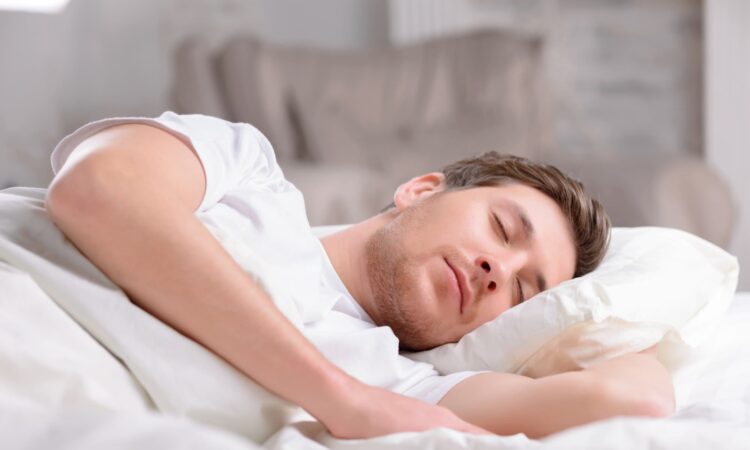
Everyone’s heard the expression “beauty sleep,” but most of us have it wrong.
Sure, getting a good night’s sleep makes you look better by preventing red eyes, dull skin and that bleary feeling.
But that’s just a short-term situation. The negative effects of one night of sleep deprivation can be remedied by a long nap.
The real danger to your beauty and health comes not from one night’s poor sleep, but from a lifetime of deprivation.
The evidence is clear: people who chronically don’t get enough sleep – or it’s of poor quality – are at higher risk of obesity than people who do sleep 7 to 9 hours every night.
Just in March this year, Yale University released a report that goes into detail how poor and too-little sleep contribute to obesity and type II diabetes.
Who’s at Risk?
One out of three Americans are sleep-deprived.
Around 40% of Americans are obese.
Those numbers are quite close. That can’t be a coincidence. There must be a huge overlap between sleep-deprived Americans and obese Americans.
Plus, 50 to 70 million Americans suffer from chronic sleep disorders. Around 9% to 15% of us experience insomnia.
In 1998, 35% of Americans got at least eight hours of sleep every night. But by 2005, that had dropped to 26%.
The Vicious Cycle
Just as loss of sleep and poor sleep cause people to gain weight, weight gain increases risk for poor sleep. This includes sleep apnea.
Sleep apnea is when people stop breathing while asleep. This may or may not wake you up, but the interruption to normal breathing contributes to poor sleep.
Excess weight puts you at increased risk of sleep apnea. Losing weight reduces apnea.
Insufficient sleep also increases risk for a related issue: sleep-disordered breathing. That includes a wide range of conditions indicating impaired breathing during sleep, including: heavy snoring, significant reduction in airflow and increased resistance to airflow in your upper airway.
Sleep-disordered breathing is linked to obesity, according to an article published March 2023 by the American College of Cardiology. It’s also connected to increased risk for type II diabetes and premature death.
The Nurse’s Health Study – which followed 68,000 middle-aged American women for up to sixteen years – found women who slept six or less hours had a 15% higher risk of obesity than those who slept at least seven hours per night.
Why Lack of Sleep Packs on the Pounds
1. Inbalance between the appetite control hormones leptin and ghrelin.
Ghrelin makes you hungry, so you eat more.
Leptin makes you feel full.
If you wish to lose weight – or simply to avoid gaining additional pounds – which one do you wish to encourage?
Obviously, the leptin. And how to encourage leptin? Just sleep . . . enough.
When you don’t sleep a healthy amount, your levels of leptin go down. Likewise, your ghrelin goes up.
With additional ghrelin making you hungry . . . with insufficient leptin to make you feel full . . . of course you’re hungry.
So you eat more, and, especially, more high-calorie foods.
The tendency for sleep-deprived people to eat more has been proven by studies – and, let’s admit it, everyone’s personal experience. When you’re chronically tired, you crave food for energy.
Studies have also shown that sleep-deprived people eat more irregularly, eat out more often and eat more snacks.
2. Disorients your biological circadian clock.
Our bodies are highly tuned to the age-old cycle of night and day – as measured by sunlight, its angle and its lack during night.
When this works against you, it disrupts your body rhythms. That is, when you stay up late at night, several things make gaining weight more likely.
a. You eat late at night, stuffing your face with what is probably high-caloric, low-quality processed foods especially high in sugar and fat.
b. You are exposed to artificial light instead of darkness – even if it’s only your TV, phone or computer screen.
We evolved to spend the night – after sundown – in darkness broken only by stars and the moon.
3. Reduction in levels of human growth hormone.
4. Elevated levels of cortisol.
5. Impaired metabolism of food.
6. Disrupted sleep elevates your blood sugar.
7. Chronic fatigue reduces your motivation to exercise.
Less exercise equals fewer calories burned.
8. Drop in body temperature.
Sleep deprivation lowers body temperature. Obviously, this must result in your metabolism not burning as much energy.
That’s more calories your body then stores as fat tissue.
Suggestions for Getting More and Better Sleep
1. Most obviously – schedule at least eight hours every night for sleep (read, watch TV, post to Instagram and make love before your time to fall asleep).
2. As much as possible – I know work and family schedules create challenges – make those the same eight hours every night.
3. In the first three hours of your day, get at least ten minutes of daylight, or as much bright light as possible (sunlight preferred).
4. Don’t eat anything at least four hours before you go to sleep.
5. Perform moderate amounts of exercise on a regular, consistent basis.
6. Breathe only through your nostrils while you’re sleeping.
Use about an inch-long strip of clear, skin-gentle tape to hold your mouth shut. It goes in the middle of your mouth. Simply stick the tape from just above your upper lip to just below your lower lip. It doesn’t need to be a long piece – about the size of a postage stamp. Every drugstore carries this. (I prefer Walgreen’s to Walmart’s, and haven’t tried CVS’s yet.)
Breathing through your nostrils is a powerful tool for improving the fat-burning of your metabolism and preventing sleep apnea.
7. For hours before you sleep, do not consume caffeine, nicotine or alcohol.
https://www.lifeextension.com/magazine/2023/12/sleep-obesity-dementia
https://www.sleepfoundation.org/physical-health/obesity-and-sleep
https://www.ncbi.nlm.nih.gov/pmc/articles/PMC6196958/
https://www.hsph.harvard.edu/obesity-prevention-source/obesity-causes/sleep-and-obesity/
https://www.ncbi.nlm.nih.gov/pmc/articles/PMC9031614/
https://www.yalemedicine.org/news/sleep-diabetes-and-obesity
https://www.hsph.harvard.edu/obesity-prevention-source/obesity-causes/sleep-and-obesity/
https://www.nlm.nih.gov/pmc/articles/PMC2727237/







